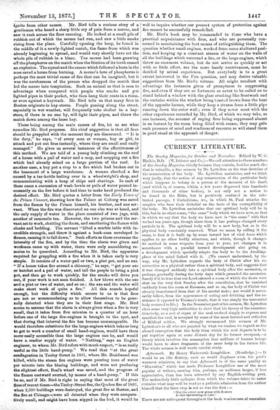CURRENT LITERATURE.
The Sunday Magazine for October and November. Edited by W. G. Blaikie, D.D. (W. Isbistor and Co.)—We call attention to those numbers of the Sunday Magazine chiefly because they contain, besides much else
that is valuable, a fino sermon by Mr. Lyttolton on the true doctrine of the resurrection of the body. Mr. Lyttolton maintains, and wo think
very justly, that the notion of any resurrection of the particular body which happens to belong to a person at the moment of his death (and which is, of course, within a few years dispersed into hundreds and thousands of other bodies), is not only not a notion to be found in the Bible, but is positively confuted in the cele-
brated passage, 1 Corinthians, xv., in which St. Paul attacks the sceptics who base their disbelief on the facts of the corruptibility of
the body. Mr. Lyttelton maintains that our spiritual body will be in this, but in no other sense, "the same" body which we have now, as that in which we say that the body wo have now is "the same " with that we had ton years ago, though since then it has perhaps changed every particle in it. The spiritual body will be a new body, but so is the physical body constantly renewed. What we mean by calling it the same, is that it is built up by some inward law of vital force which applies to no other bodily structure, and which, though it changes its method in some respects from year to year, yet changes it in accordance with a parallel inward development also going on, a development which specially adapts the body to bo the dwelling- place of the mind linked with it. (We cannot understand, by the way, why Mr. Lyttolton regards the body of Christ after his re- surrection as a physical rather than a spiritual body, and suggests that it was changed suddenly into a spiritual body after the ascension, or perhaps, gradually daring the forty days which preceded the ascension. Surely if it be true that our Lord entered a room of which the doors were shut on the very first Sunday after the crucifixion, that he vanished suddenly from the room at Emmaus, and so on, the body of Christ was already transformed from that of his mortal state; nor would it neces- sarily follow, from the appearance of eating and drinking and the re- sistance it opposed to Thomas's touch, that it was simply the terrestrial body restored to life.) In the November part of his sermon, Mr. Lyttelton cites some very high authorities to show that his theory of the resurrec- tion-body, as a sort of organ of the soul evolved simply to express and manifest the soul, is accepted by some of the most learned and orthodox of Biblical critics. We strongly recommend this sermon of Mr. Lyttelton's to all who are puzzled by what we confess wo regard as the absurd conception that the body from which the soul departs is to he put together again at some distant day for its former occupant,—a theory which involves the assumption that millions of human beings would have to share fragments of the same body in the future life. The whole sermon is well worth careful study.


































 Previous page
Previous page